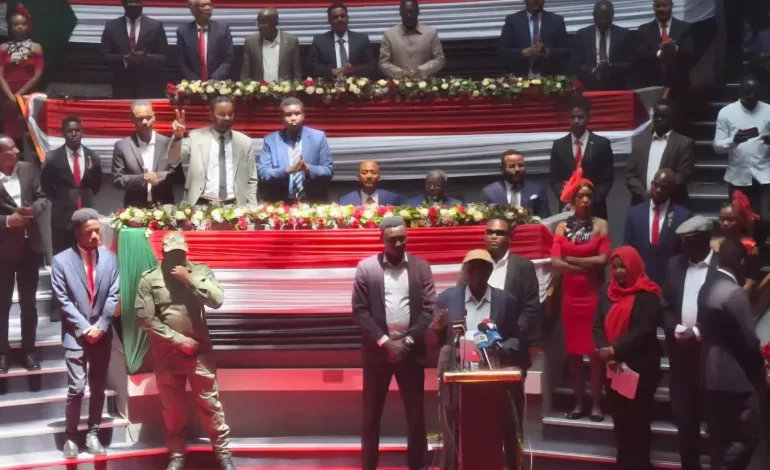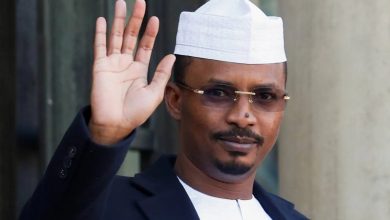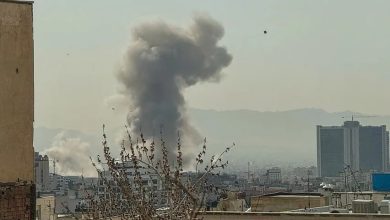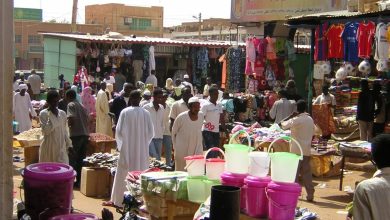Behind the Divisions Within Organizations That Allied with the Rapid Support Forces

Sudan Events – Agencies
The alliance of political organizations and armed movements with the Rapid Support Forces (RSF) to form a parallel government in areas under their control has caused turmoil and divisions within these organizations. This development complicates the Sudanese political landscape, opens the door to further fragmentation, and threatens Darfur with new political polarization, according to analysts.
The adoption of this initiative by factions of the Revolutionary Front and figures within the Coordination of Democratic Civil Forces (Taqaddum) led to the dissolution of the coalition and the emergence of a new bloc on February 10, called the Democratic Civil Alliance for the Forces of the Revolution (Sumood), which appointed Abdullah Hamdok as its leader.
Conversely, forces gathering in Nairobi are preparing to sign a founding charter for the “Government of Peace and Unity,” which includes political parties, armed movements, civil society organizations, traditional leaders, and the RSF. They have named their organization the “Sudan Founding Alliance,” which seeks to establish a government to promote Sudan’s unity and peace while challenging the legitimacy of the Port Sudan government.
New Divisions
As the newly formed “Founding Alliance” convened in Nairobi on Tuesday, the National Umma Party threatened to take action against its acting leader, Fadlallah Burma Nasir, for his participation in the alliance and for addressing its founding conference.
The party’s presidential body stated that Nasir was not authorized to represent the party at the conference of the parallel government forces in the Kenyan capital. In a statement, it announced that the party’s institutions would meet to take necessary measures against unauthorized participants.
Rabha Al-Sadiq Al-Mahdi, a senior Umma Party member, described Nasir’s participation in the parallel government as “political suicide” for him personally and an attempt to “sacrifice the party.”
Meanwhile, Abdul Rahman Al-Sadiq Al-Mahdi, Deputy Head of the Ansar Religious Sect—historically affiliated with the Umma Party—toured the party’s strongholds in Al-Jazira and White Nile states following the Sudanese army’s recapture of these areas. Expected to lead the party in its upcoming general conference, he reaffirmed support for the army and criticized what he called an “attempted hijacking” of the party, referring to Nasir’s actions.
Similarly, the Democratic Unionist Party (Original) disavowed the participation of its former leader Ibrahim Ahmed Al-Mirghani in the Nairobi alliance. Party spokesperson Omar Khalafallah clarified that Al-Mirghani had been dismissed as the party’s political secretary in October 2022 and was referred for investigation. His failure to appear before the committee resulted in his expulsion.
Dismissals and Resignations
Within the armed movements, senior leaders of the Justice and Equality Movement (JEM) announced the dismissal of its leader, Suleiman Sandal, and appointed a new leadership. They justified this move by stating that Sandal’s participation in the parallel government contradicted the movement’s principles and political stance.
JEM’s social sector head and leadership member, Abdul Rahman Fadl Al-Tom, affirmed their support for the Sudanese people in the ongoing war, declaring that if necessary, they would stand with the people against any violations.
Speaking to Al Jazeera Net, Al-Tom said, “Sandal violated the movement’s founding principles by allying with the RSF, which has committed crimes against the Sudanese people.”
Similarly, within the Sudan People’s Liberation Movement-North (SPLM-N) led by Abdelaziz Al-Hilu, resignations surfaced on social media after Al-Hilu’s involvement in the “Founding Alliance.” The resigning members strongly criticized his decision.
Adam Musa Abu Al-Tayman, SPLM-N’s representative in Canada, accused Al-Hilu of “selling out” the Nuba Mountains cause. He claimed Al-Hilu had pushed through a resolution among close associates to cooperate and coordinate with the RSF, sparking widespread outrage within the movement’s leadership. He warned that this would lead to the movement’s destruction.
Differing Objectives
Political analyst and researcher Khalid Saad believes that each group allied with the RSF has distinct objectives. The internal divisions within some of these organizations can be viewed from both regional and political perspectives.
Speaking to Al Jazeera Net, Saad explained that certain political organizations and armed movements see the alliance as a new leverage point, given their inability to position themselves politically or secure power. They believe this partnership might integrate them into any future political settlement between the warring factions or allow them to inherit RSF’s military influence.
He also argued that the RSF, with its regional and external alliances, is more influential than other groups. However, he does not rule out the possibility that the RSF might use these factions for its own benefit and later discard them.
Saad warned that this situation could lead to further fragmentation of political forces and reinforce regional and geographical divisions. “The most dangerous consequence,” he noted, “is the increased likelihood of foreign interventions in Sudan’s affairs.”
Similarly, political analyst Fayez Al-Silik argued that internal splits within political forces cannot be simply attributed to infiltration or weak leadership. Rather, he sees them as deeply rooted in Sudan’s political landscape.
According to Al-Silik, these divisions must be understood in their broader historical and social contexts. “These political and civil forces emerged in an environment dominated by narrow tribal affiliations, rigid religious loyalties, and a patriarchal society that stands in stark contrast to modernity,” he wrote in a commentary.



